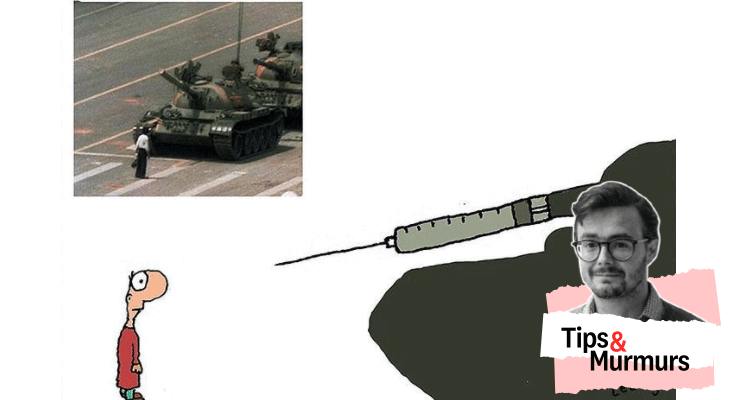
Top Marx Interesting times at Broken Hill’s the Barrier Daily Truth. Via Jack Marx’s Facebook page:
There’s a job for a journalist going at the Barrier Truth. The newspaper I work for … [It] is taking its first dolly steps toward becoming Australia’s most defiant and outspoken newspaper — completely independently owned, and beholden to none. It’s been around for over 100 years, and, while it’s been a quiet community newspaper for a while, it’s about to launch itself into the guts of Australia, with a new website and a new approach to journalism … People with carrots up there kazoos need not apply.
If you’re not familiar with Marx and his place in Australian letters, that last line gives you some indication. Marx is one of the the great “characters” of Australian journalism. Once described by Crikey as a “one-man ethical dilemma”, Marx is a fine and lively writer, a bridge immolator of the highest order who has worked and ceased working at most publications in Australia. His most famous works, on Stevie Wright and Russell Crowe, accrued complaints and awards in equal measure. Honestly, we can’t wait to see what comes of the Truth‘s gonzo lurch.
Different hoax for different folks Last Friday the €1 million Planeta prize — the world’s highest-paying literary prize — was awarded to Carmen Mola, who everyone believed was the pen name of a female university professor. But it turned out to be three middle-aged blokes who work as TV writers on Spanish shows. It put us in mind of other great literary hoaxes:
- Helen Dale/Darville Darville published — under the pseudonym Helen Demidenko — The Hand that Signed the Paper in 1994. The story of a collaborator Ukrainian family during the Holocaust, the novel was already controversial and accused of anti-Semitism when it was revealed that Dale had manufactured her supposed Ukrainian ancestry
- Ern Malley Australia’s greatest literary hoax. Malley was the product of writer James McAuley and Harold Stewart, his work a parody of the modernist poetry the pair despised. Malley was hailed as a genius before the hoax was revealed
- Norma Khouri Khouri achieved bestseller status with 2003’s Forbidden Love, the putative memoir of her best friend in Jordan. After an 18-month investigation, Malcolm Knox published a series of articles in The Sydney Morning Herald concluding the book — already subject to serious questions due to factual inaccuracies, shaky timelines and describing a major crime no one had heard of — was a total fabrication. Khouri maintained the book, allowing for some “literary licence”, was true.
Well that took an Age The catastrophically dangerous whimsical solipsism of Michael Leunig will no longer grace the Monday issue of The Age and The Sydney Morning Herald. Today readers were greeted with the work of Megan Herbert — the caption informs us this is the first in a series of trial cartoonists who will run on Monday’s editorial cartoon.
Leunig has been drifting into decidedly weird territory for a while — using the marriage equality debate as an occasion for Olympic level self-pity, and telling young mums that their babies were dying on account of mobile phone apps. And then a whole bunch of vaccine scepticism, all spiced with intoxicating spoonfuls of doleful self-pity. There has been a veritable bale of final-straw moments for Leunig, but perhaps it was his flailing attempt to equate not wanting to get vaccinated with standing in front of the tanks at Tiananmen Square that proved his downfall.
How do you do, fellow kids Continuing our commitment to credit where it’s due: the following goes the opposite of how you’d expect — but in a good way. A local news segment detailing free lessons at a skate park in Detroit featured reporter Victor Williams demonstrating his skills, and … he’s great, and doesn’t stumble over a word of his piece to camera any more than he does on his 180 spins.








I feel sorry for Leunig. In the ‘Seventies and ‘Eighties he was funny, occasionally profound, and took a left-of-centre approach to his subjects. Now, he’s inward, reactionary and confused. What happens to people like him? Think Bettina Arndt, whose magazine, Issues, my brother used to subscribe to over 40 years back. She seemed liberal in the proper sense of the word, and supported thinking outside of the box on sexual mores (no pun intended). Now she’s an ogre of the Right. Were they bitten by Rupert Murdoch or Fred Nile on a night of the full moon?
Agree, always keep thinking of those appalling ‘Footy Shows’ as the negative metaphor, literally seems more about promoting an old white Australia ‘values’ with the aggressive sexism, misogyny, machismo, racism etc.; there needs to be a use by date for many in media and so much sport…..
I’m glad this stupid cartoon is the end of Leunig (for now at least). He takes up an inordinate amount of space for a talentless hack who has spent his years being peak-victim. Hopefully his departure will open up the space for some with actual talent.
The thing about Leunig is the reaction readers have to his drawings. Its not about him, its about you, and from the look of things, he’s managed to hook in a number of people, who need to examine their reactions.
Why?
Happy news about Leunig. Pious and out of touch.
Wondering if Norma Khouri is related to Phil Coorey?
It’s a pretty common Lebanese name.